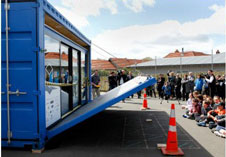 Thursday 12 May 2016 2:51pm
Thursday 12 May 2016 2:51pm
Lab-in-a-Box phase 1 took science to the country. In 2016 Lab-in-a-Box phase 2 will encourage the country to take on science.
The University of Otago has gained funding for two innovative projects aimed at engaging New Zealanders, and young people in particular, to learn more about science and technology.
The two projects are among 44 “Unlocking Curious Minds Contestable Fund” grants announced by Science and Innovation Minster Steven Joyce this week.
The Fund was developed under the A Nation of Curious Minds – He Whenua Hihiri I te Mahara – a National Strategic Plan for Science in Society. Curious Minds is a cross-agency programme of work led by the Ministry of Business, Innovation and Employment, the Ministry of Education and the Office of the Prime Minister's Chief Science Advisor.
Otago's latest projects:
Lab-in-a-Box 2: The country taking on science
Associate Professor Peter Dearden (Biochemistry)
$137,821
In 2015 Lab-in-a-Box was built and taken on its inaugural tour of the South Island. In 30 days over 4000 people engaged with Lab-in-a-Box, its scientists and educators. Lab-in-a-Box phase 1 took science to the country. In 2016 Lab-in-a-Box phase 2 will encourage the country to take on science. The Lab-in-a-Box will visit more remote communities (including Stewart Island) and new audiences, and will engage these communities on the key scientific issues of importance to them as well as getting them involved in a citizen science programme based around water quality.
Making a good impression: from fossils to false teeth
Professor Richard Cannon and Dr Carolina Loch (Faculty of Dentistry)
$26,106
Children from lower decile schools have fewer opportunities for hands-on science activities than pupils from high decile schools and also experience poorer oral health. This project will use children's interest in animals and fossils to engage pupils from low decile Dunedin primary schools in a hands-on activity: making impressions of animal teeth. Accompanying videos will explain the science behind fossil formation, dental impression taking, tooth shape and function, and the importance of looking after your teeth for good oral and general health. This programme will stimulate children's interest in a variety of sciences and lead to better oral health.
A list of Otago experts available for media comment is available elsewhere on this website.
Electronic addresses (including email accounts, instant messaging services, or telephone accounts) published on this page are for the sole purpose of contact with the individuals concerned, in their capacity as officers, employees or students of the University of Otago, or their respective organisation. Publication of any such electronic address is not to be taken as consent to receive unsolicited commercial electronic messages by the address holder.